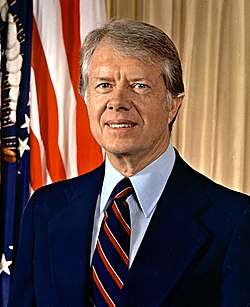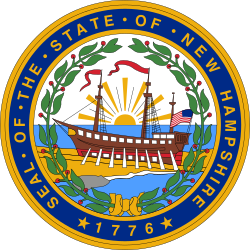Details
The New Hampshire primary was the third contest in the nation, held after the Iowa caucuses and the Maine caucuses. The primary was won by incumbent President Jimmy Carter by a relatively narrow margin for an incumbent president. Carter received 49% of the vote and 10 delegates, while his main challenger, Senator Ted Kennedy, received 39% of the vote and 9 delegates. [1] [2] California governor Jerry Brown received just under 10% of the vote, but did not earn a single delegate.
This is the last New Hampshire primary in which an incumbent President running for re-election lost at least one of the Granite State's 10 counties.
This page is based on this
Wikipedia article Text is available under the
CC BY-SA 4.0 license; additional terms may apply.
Images, videos and audio are available under their respective licenses.




